Healing trauma: Research links PTSD, emotion regulation and quality of life
We often talk about the coronavirus pandemic in terms of health or economic impacts: the numbers of cases and deaths, the persistence of long-haul COVID, lost jobs and toilet paper shortages.
But there is another crisis, too, that can linger even as cases fall in an increasingly vaccinated population. The pandemic is a type of mass trauma, explained Binghamton University doctoral candidate in psychology Craig Polizzi. And trauma can and does give rise to post-traumatic stress disorder (PTSD), and potentially problematic behaviors and a lower quality of life.
Recent research from Polizzi, fellow graduate student Damla Aksen and Distinguished Professor of Psychology Steven Jay Lynn provides insight into the impact PTSD has on emotional regulation and quality of life, and points to ways to improve both. Their article, “Quality of Life, Emotion Regulation Dissociation: Evaluating Unique Relations in an Undergraduate Sample and Probable PTSD Subsample,” was published in a recent issue of the journal Psychological Trauma: Theory, Research, Practice and Policy.

